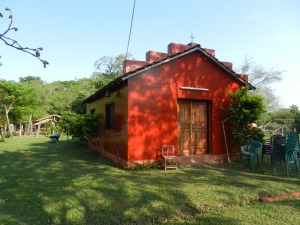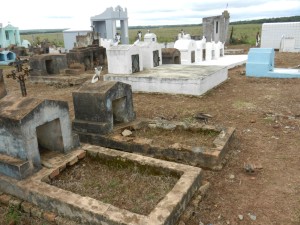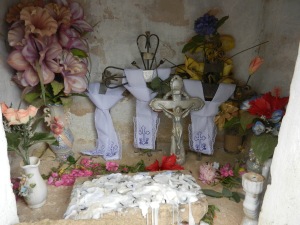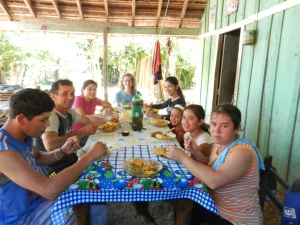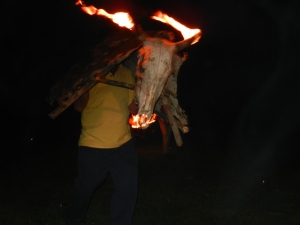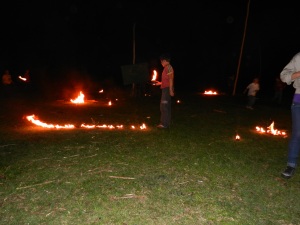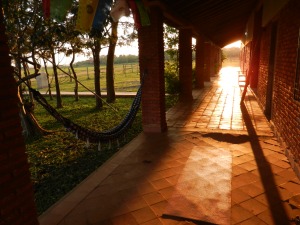Date: 2-6-13
“The first time you share tea… you are a stranger. The second time you take tea, you are an honored guest. The third time you share a cup of tea, you become family… You must make time to share three cups of tea.” – “Three Cups of Tea” by Greg Mortenson and David Oliver Relin
The Dustbowl of 2013: I’m writing on a Thursday with the promise from neighbors that it will rain tomorrow. The village is very excited. Storm clouds gathered tonight at sunset and the wind picked up. It was suffocatingly hot today, 103 degrees, and like breathing through a warm wet blanket. Even at 10pm the fans (ventiladores in Spanish) are earning their keep and relief is finally coming with the wind whipping ahead of the storm, cooling temps a bit and keeping mosquitos at bay. The power falters repeatedly. The Professor, with his connections, arranged for a tank of water to be delivered today and filled the well higher than I’ve ever seen it. I wanted to do a happy dance. No laundry in the rio afterall and the continued assurance of daily bucket baths and clean drinking water.
A couple weeks ago I made my way to Asuncion, PY’s capitol. I had business and errands at the Peace Corps office and needed a little time away from the campo. I called a nearby volunteer who also lives in the Department of , and is my favorite traveling companion. Lucky Sagittarius that he is, this Kentucky mountain man with the preacher’s hat is a people magnet who casually turns any mishap into the best adventure. He agreed some time in the big city would do him good after a rough week. My one hour walk to the bus stop entailed watching ominous clouds gather, sure that it wouldn’t possibly rain TODAY, since it hadn’t rained in two weeks. Rain it did but, with impeccable timing, held off until the exact second I reached the awning of the bus stop. Then it poured. And the wind picked up and made it impossible to stay if I wanted to maintain any dryness. I ran across the street to a beautiful overgrown bush resembling a giant Easter lily with yellow trumpet-shaped flowers which provided fantastic shelter as I hovered under it, crouching over my backpack and the laptop hidden within to keep them dry. The rain lasted only 10 minutes but it gave me time to pause and be present. With my head bowed I watched the water collecting on my curls, slowly sliding, gathering, building into droplets as they slipped toward the ends, like kids on a waterslide, then gracefully fall onto my ankles. My ankles were quickly speckled with dust and raindrops. I lifted my foot outward into the rain hoping to wash off the dust. When the rain subsided I tried rinsing my feet in a shallow sidewalk puddle. Stupid. Before the rain, the sidewalk was dirtier than my feet from the road dust. It was essentially a warm, watery puddle of mud.
Shortly thereafter the bus arrived and took me through new parts of prairie, past plantation after plantation of pines and eucalyptus trees and others I didn’t recognize, all standing in perfect formation like obedient soldiers. The tallest had foliage only at the very top and reminded me of giant rows of harp strings with cattle grazing beneath and between. We continued for two hours down this never-ending bouncy dirt road where the prairie stretched to an endless horizon, reminding me of the ocean back home, then closed in and became familiar smaller pastures like you’d find in any quaint New England country town. The smells of rain, rotting fruit, manure, and the bus’ ancient vinyl and polyester seats filled my head. The road became ugly as the rainstorm made friends with the clay soil and played games with the wheels on the bus. One moment we’re slip-sliding down a small hill and the next spinning our wheels at the slightest incline. It was a bit harrowing so I did what any logical person would do: went to sleep.
In Yuty (pronounced joo-tu), officially the most southern place in the world I have visited thus far in my life, I saw an employee at the bus terminal using crutches because his feet had grown backwards but bless him for working and the terminal for hiring him. The other volunteer and I arrived in Asuncion at 4:30am and found rooms at a beautiful new hostel downtown. I was so excited for a hot shower. We filled the day with errands at the Peace Corps office, lunch of great Chinese food, a friendly and random chance meeting on the sidewalk with an alchemist who gave us mounds of fresh fruit from his home, and catching up with a Paraguay friend, Ernesto, who lives and owns a leather goods shop in Mercado 4 and who took time away from the business to show us around. He’s super sweet. We treated ourselves to massages and headed back to the hostel where we met a Russian-German man who speaks 8 languages, has lived in Brazil a number of years and moved to PY only two weeks ago. This is what I love about hostels. You meet interesting people. We were joined by another volunteer friend and sat around sharing stories into the night.
The next morning I was refreshed and ready to rejoin my community. In a cab ride back to the bus terminal we were surprised to find ourselves in a new car in mint condition complete with new-car smell and lace seat covers….a rarity in PY, or anywhere for that matter!
My host Mom, Isabel, and I were chatting recently about food. She confessed that PY doesn’t have much in the way of food preparation education. Recipes and cookbooks in the campo are rare. Most recipes are passed on by family, hence why one family’s sopa may be very different from another’s. She added that many women in our community are eager to learn how to prepare healthier food and lose weight but don’t know how. I see some nutrition workshops and cooking classes in our future!
This last week of January has been packed with bee projects from which I finally obtained my own hive of bees. Having this work has greatly improved my overall satisfaction and minimized the normal ups and downs, at least for now. It feels good to have solid work and make a tangible contribution through beekeeping for those families. Most bees here are Africanized or the infamous “killer bees.” I did three wild-hive captures (trasiegos) with various members of my community and a honey harvest with my host family. Now that my community knows I can help them with bees, invitations keep pouring in from families wanting help and folks are eager to tell me where to find the next takuru (termite mound). Let me clarify: invitations come from families with whom I’ve built relationships. Like most places in the world, nothing is accomplished here without first building relationships (and building toward your “Three Cups of Tea” as it were). And even the most pressing matter may still take a backseat to first sharing terere with a circle of family or friends. A simple walk down the street always involves saying hello to everyone and asking about their family.
A trasiego involves moving the bees from their wild hive and putting them into a wooden hive that is managed by the family on their property. Wild hives are often found here under termite mounds, in coco trees or in holes in the soil. Often you can also harvest some honey during a trasiego, depending on the time of year. We are nearing the end of honey harvest season but were able to collect some honey in all three cases. Bees tend to be much more tranquilo during a trasiego than during a honey harvest because in a trasiego you are destroying their home, they are confused and go into survival mode rather than their typical defensive mode when you simply steal their honey. This is not to say they won’t sting because they will but overall they’re much more tranquilo. In fact, we often handle them with bare hands while scooping them from the wild hive into their new box! It’s incredible how much heat they produce in the depths of the hive and the vibration of their wings on your hands is amazing and, at first, quite unsettling.
The first trasiego was a subterranean colony living under a termite mound on the prairie. I had three volunteers who visited for the weekend to help and get additional practice for themselves. The family didn’t originally want to participate at all, the husband citing an ‘allergy’ to bee stings (I think every man in my village conveniently has an ‘allergy’ to bee stings). But ultimately the entire family was an integral part of the process, from rebuilding an old wooden hive to sewing honeycomb onto the frames of the new hive and scooping bees into their new home. Even the teenage boys came up close and helped with the smokers to keep the bees calm. The family was very proud of themselves and their new hive in the end. The second trasiego was the first on my own and I felt pretty confident. I worked with two ladies in their 50s, their first trasiego each. Again, neither wanted to be hands-on originally but, with a littIe convincing, they were cracking open the fallen coco tree with a machete, sewing comb onto the frames, keeping the smokers going and the bees calm, and learning the difference between cells containing honey, pollen and baby bees. In fact, we witnessed three ‘newborn’ bees hatching from their cells that day. Incredible because they come out fully grown, walking perfectly and ready to work. When we pulled a pristine, three foot chunk of honeycomb from the tree we all smiled and posed for a photo taken by one of my host family’s daughters, standing a ‘safe’ distance away in the brush. They realized handling bees was actually quite fun and finished with a new sense of confidence and accomplishment. Personally, I find working with bees very meditative because you can’t think of anything else when you are with them. The final trasiego was another, huge, termite mound on the prairie. A neighbor had planned to harvest the honey and invited me to keep the bees for myself afterward. Score. The final piece of a trasiego after putting them in the box is to leave the box there for a day or two so the bees who aren’t yet inside will find their way there and you take as many from the old hive as possible. Then the following night after dark you move the hive to its permanent location on your own property. Since I don’t have a property my host family offered a spot in the forest on their property for my new bees to live. The problem with this hive is that the days were so hot the bees wouldn’t stay in the box so we could move them off the prairie to their new home. Instead they were clustering outside and underneath to stay cool. So we got up at 5am the third morning and took what we could. Wrapping the hive in a sheet to prevent escapees and stings, we trekked the bumpy mile across the prairie and crop fields to their new location. As we put the box in place, we could hear the angry buzzing of 40,000 pissed off bees now loaded for bear from being so rudely jostled and awakened so we quickly removed the sheet and ran like hell. It was a fantastic week and the unanticipated benefit of this work is that my villagers insist I take home some honey for helping them.
I’ve been trying to move my bin of California red worms from the old volunteer’s house to the school garden for lessons in using worms for composting when the school year begins later this month. It took two attempts as the first try was thwarted by fire ants. I heard them before I saw them. I looked up at the sound of rustling thinking a horse or cow was moving through the bushes nearby. Initially I saw nothing but then the leaves on the ground started moving and I realized an army of fire ants was headed straight for us. Because ants don’t like wet conditions, we made a temporary barrier by emptying two buckets of water around the area but it wasn’t enough to stop them. We fled and finished the following week. During that attempt, the 10-year old from my host family told me to stop and listen to the birds. They were really squawking and she told me it was because a snake (serpiente) was near. With this newsflash I just wanted to finish the damn project and get outta there. I cursed myself for forgetting my machete this day. We worked faster, walked carefully and were glad to finish after a few trips with the wheelbarrow. Pay mind to the birds’ song for they speak when the serpent is near.
Speaking of insects and dryness, we’ve been hit with a sudden onslaught of new insects who either prefer the dry conditions or are looking for water as desperately as everything else. Many of these insects are stinger types like wasps, clinging to wet laundry on the line and sucking the moisture from it.
It’s “carnaval” season in PY. There are two types of carnaval. One is the infamous fiesta scene such as that in Encarnacion and Asuncion with fireworks, festivities, and scantily-clad dancers donning heels and plumage like a Victoria’s Secret runway model. The other meaning for carnaval is ‘water fight!’ haha Isabel encourages me to carnaval her daughters, normally Irma, when they joke with me. The other day the family was on the patio chatting away and I snuck up behind Irma after she’d given me a ration of joking and gave her a good squirt with my water bottle. Water fight and peals of laughter ensued!
February 12 is my site presentation which means my supervisor and our technical guru will visit my site to meet with my villagers, explain Peace Corps, my background, expectations the village should have of me and Peace Corps has of my village to support me. During this time, they also inspect my future living space: a classroom in an old, unused school building. I love my host family but can’t wait to move, have my own space, and make my own food again! I’m busy finishing my family visits and ensuring everyone has an invitation to the gathering.
Recently my family made chipa, a very popular bread made of corn and mandioca flour and usually shaped like a bagel or baguette. We enjoyed a breakfast of chipa and hot chocolate in the coolness and sunrise of one early morning. This reminded me of the croissants and delicious hot chocolate I had years ago in a tiny French café while chaperoning my daughter’s eighth grade class in Quebec City.
Random additions:
I recently finished reading “Water for Elephants” by Sara Gruen (couldn’t put it down and read it in one day) and “Three Cups of Tea” by Greg Mortenson and David Oliver Relin. “Three Cups” portrays Greg’s life as a mountain climber who went on to build schools for children in the Himalayan mountains of Pakistan and Afghanistan. If you’re a climber, interested in other cultures and/or the politics pre-and-post- 9/11 of Pakistan and Afghanistan this one might peak your interest. Next is the sequel to “Three Cups” called “Stones into School” which I am liking even better.
“Air tissue” is a popular practice here. Plus it helps with trash management. I’ve never seen a Paraguayan use a paper tissue.
It is common for Paraguayans to cook meals in a single pot. This is why stews or “caldo” is so popular. It is also very common for vegetables and meat to be cut into tiny pieces. Fewer pans, less clean up, faster cooking and thus less fuel used.
One day at the bus stop I met a woman with 14 siblings, 11 of whom were living. But she doesn’t take the record. Last week I met someone whose cousin had 17 kids and none were twins!
On my walk home from the bus one day, courtesy of a fantastic view of the prairie, I counted the smoke from 11 prairie fires. Our normally cloudless, bright blue sky was hazy for the next couple days. Everything is dangerously dry from the drought.
When you visit a Paraguayan family, their hospitality second to none, they always end the visit asking when you will visit again. At first, I just thought they enjoyed the visit and wanted me to come back. Later I realized it’s what they all say to conclude a visit. Haha!
Condiments here like mayo and ketchup are sold in small, single serve squeezable pouches, convenient for those who have no refrigeration. Spices are sold in small plastic sleeves but I’m not sure why this convention is popular. Perhaps to be used more rapidly to prevent insect infestation? I remember while working for Hannaford that our Latino populations in the US prefer the same type of spice packaging over the flip-top or screw-top canister style with which I grew up.
Don’t forget to tell your favorites that you love them.











